The Portuguese Institute for Sea and Atmosphere, I. P. (IPMA, IP) is Portugal’s national meteorological, seismic, and oceanographic entity.
We recently had a conversation with Vítor Hugo Magalhães, assistant researcher at IPMA.

Name: Vítor Hugo Magalhães
Organisation: Portuguese Institute for Sea and Atmosphere, I. P. (IPMA, IP), Marine Geology and Geo-resources division
Business area: Marine Geology Research
Position in the company: Assistant Researcher
INESC TEC centre with which the company collaborated: Centre for Telecommunications and Multimedia (CTM) and Centre for Robotics and Autonomous Systems (CRAS)
Project name and manager (INESC TEC): GROW (lonG-Range brOadband underwater Wireless communications), Rui Lopes Campos
What is the connection between IPMA and INESC TEC?
IPMA and INESC TEC have worked together in several research projects; in my case, it started in 2015, within the scope of two projects: BLUECOM+ (PT02_Aviso4_0005) Connecting Humans and Systems at Remote Ocean Areas using Cost-effective Broadband Communications, funded by EEA Grants, and GROW (PTDC/EEI-COM/29466/2017) Long-range Broadband Underwater Wireless Communications, both coordinated by Rui Campos.
What are the main results of these projects?
Both projects focused on the development of innovative maritime (BLUECOM+) and underwater (GROW) communication concepts and their demonstration in a real-life situation. IPMA was responsible for defining the main scenarios for the application of these communication solutions and coordinating the proof of concept in a real environment.
These initiatives presented feasible, low-cost solutions to maritime and underwater communication issues we face during the research endeavours that IPMA carries out frequently.
How do you rate your experience with INESC TEC?
The collaboration with INESC TEC has been extremely useful and very beneficial to IPMA – and vice-versa, I think. Thanks to our collaborative actions, IPMA could contact with researchers and experts from many fields that complement our institution’s areas of research. Moreover, we are now capable of addressing and solving maritime and underwater communication issues more efficiently – something we wouldn’t be able to do by working independently.
What do you value the most in this collaboration?
The fact that it enables the close and strong connection between different areas of research, with different outlooks and knowledge, which together favour the development, testing and application of solutions to address specific problems.
What can we expect from IPMA in the upcoming years?
IPMA is working towards the acquisition of long time series of various geophysical, geochemical, sedimentary, and biological parameters from the ocean, as well as data regarding the geological characterisation of the seabed, focusing on natural hazards and living/non-living resources. In this sense, our collaboration with INESC TEC and the way the areas of research complement each other, will be extremely important. Moreover, future collaborations between the two institutions will be very beneficial to both, and crucial to the development of research projects with a high level of excellence.




 News, current topics, curiosities and so much more about INESC TEC and its community!
News, current topics, curiosities and so much more about INESC TEC and its community!